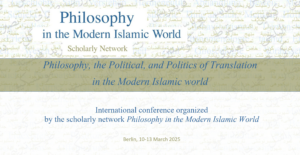News
Posts by Kata Moser
by:

The network organizes the international conference “Philosophy, the Political, and Politics of Translation in the Modern Islamic World” in Berlin, 10-13 March 2025 and calls for proposals on the topic. Researchers in early phases of their academic career and colleagues from the MENA region are especially encouraged to apply.
Philosophers read, think and write in various languages, and so do scholars and intellectuals who are engaging with their works. Translation is an integral part of the philosophical praxis. It often plays a decisive role in the shaping of concepts, the emergence of philosophical currents and the construction of arguments. Translation is an active process of understanding, adapting and embedding in the conceptual framework to which the translator contributes. This framework, in turn, is simultaneously influencing the very activity of translation and is altered by it. Hence, translation in the philosophical praxis has a political dimension that goes beyond the individual choices of a translator and is embedded in the historical formations of knowledge cultures. For philosophers in the MENA region, the question of translation is particularly important due to the multilingual characteristics of the field, the praxis and its actors, the colonial imprint on epistemological and linguistic formations associated with languages, and the tension between the perceived necessity to participate in European and American philosophical discourses and—at the same time—doing justice to local discourses.
The international conference will address the following aspects:
- Concepts in translation: How are historical difference and identity constructed through (cultural) translation? How do we deal with the problem of particularity versus universality, the local versus the global in the study of concepts in translation? How do historical relations and power differentials between source and target languages influence terminological choices in the translation of concepts?
- Translation as a historical phenomenon between European languages and languages of the MENA region, but also between languages of the MENA region: What is the translation history of a particular work or philosophical current? How is translation inflected by the dimension of the political? How did translation interact with local archives of knowledge and how did these archives develop by way of translation?
- Translations and teaching: How are philosophical works translated for the classroom and what are lacunae in this translation process? How are translations used in various scenarios in the classroom and how is their political dimension addressed? What are good examples of such translations and why?
- Reflection of the practice of translation / “philosophy of translation”: How do translators expand on this issue in their introductions to translations and how do scholars discuss the issue of translation philosophically? How do we reflect ourselves on theory, practice and meaning of translation in our renditions of philosophical works? What are the philosophical implications of particular translation choices?
Practical information
We are looking for contributions to these but also related aspects of philosophy, translation, and the political. We especially encourage researchers in early phases of their academic career to apply. Please send your proposed abstract (max 300 words) and short CV for review until 25 August 2024 to the conveners of the conference Roman Seidel and Kata Moser to the email address conference25@philosophy-in-the-modern-islamic-world.net. The decision will be communicated until Mid-September 2024.
Travel and accommodation expenses for contributing participants will be covered by the organizers.
The official conference language is English, contributions in other languages are possible if the contributor has at least a passive command of English and provides a written English translation to the organizers 4 weeks ahead of the conference.
Link to complete call
Send your proposal to conference25@philosophy-in-the-modern-islamic-world.net on behalf of Roman Seidel and Kata Moser
